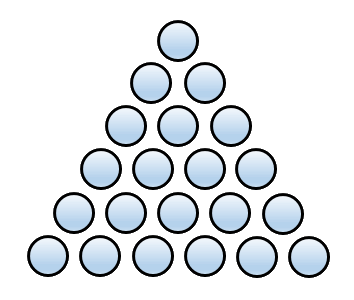Counting the cup game
Mabel is playing a carnival game in which she throws balls into a triangular array of cups.

She will throw three balls, and she will win the game if the three balls are in a straight line (not necessarily adjacent) and in different cups.
Disregarding the order the balls go into the cups, how many ways can she win the game?
The answer is 114.
This section requires Javascript.
You are seeing this because something didn't load right. We suggest you, (a) try
refreshing the page, (b) enabling javascript if it is disabled on your browser and,
finally, (c)
loading the
non-javascript version of this page
. We're sorry about the hassle.
3 solutions
can u elaborate how u got 9 as the balls placed perpendicular to the triangles side
Why do we get +9 : it can be 6 i think.
its because for each side of the triangle, there are 3 ways that the balls can be perpendicular to that side: one starting from the 3rd ball from the left up, another starting from the 4th ball from the left up, and one starting from the top vertex down.
Another way to compute this is to get the 7 t h value from a table A194131 : 1 2 1 6 . Then subtract it from the number of combinations of 3 points on the lattice ( 3 2 1 ) − 1 2 1 6 = 1 1 4 .
This is a cool sequence. I was actually thinking of making the triangular lattice 7 on a side, but then that would give possibilities for 3 co-linear points that were neither parallel nor perpendicular to the sides. I thought that would have been a bit unfair.
Having the balls go up or down the sides at an angle is also a straight like. The question should have said horizontal or vertical.
Log in to reply
Having the balls go parallel to the left or right side is included in the solution. Note the multiplication by 3 when computing how many arrangements are parallel to one of the triangle's sides.
How do you derive the expression to get the sequence in A194131?
Notice that there are 2 cases for where the line connecting the balls can be. Case I: It goes through consecutive balls and Case II: It goes through some “empty space” not touched by any balls. For case I it is simply Hockey Stick but applied to all 3 sides, so 3*7C4=105. For Case II we can take it step by step. If the first ball lands on one of the vertices of the triangle, there is only one way to have the other 3 balls such that they are collinear. If the 1st ball lands on one of the rows consisting of only 2 balls, there are 2 cases to satisfy a collinear arrangement of balls. Therefore in total there are 3 arrangements that work, but remembering that we must account for all 3 sides, we add 9 to 105 to get 114.
The balls could be place in a line that is parallel to one of the triangle's sides.
The number of ways this could happen is:
3 k = 3 ∑ 6 ( 3 k ) = 3 ( 4 7 ) = 1 0 5
This sum is computed using the hockey stick identity .
The balls could also be placed in a line that is perpendicular to one of the triangle's sides.
The number of ways this could happen is 3 × 3 = 9 .
The total number of ways she could win is 1 0 5 + 9 = 1 1 4 .